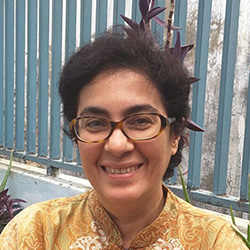
Furniture and wood carving produced in the Indonesian city of Jepara and its surrounding area on the north coast of Java Island is widely known for its unique designs and high quality.
Wood products from Indonesia — especially furniture — are exported to more than 100 countries, at an increasing rate. In 2019, their export value was $1.7 billion. The United States is the primary destination, and tallied with Japan and three European Union (EU) countries, the Netherlands, Germany and Belgium, the country is one of five top destination countries.
Despite a 2007 CIFOR survey, which shows that more than 90 percent of the producers are micro-, small- and medium-sized enterprises (MSMEs), the sector has a large footprint. It is invaluable to Indonesia’s economy. The Jepara wood-processing sector generated an export value of $187 million in 2019 or about 10 percent of the country’s total national exports.
However, the high demand for wood products also has a big impact on raw material extraction. To ensure timber is sourced legally, Indonesia’s Ministry of Environment and Forestry introduced the Indonesian Timber Legality Assurance System, known by its Indonesian acronym SVLK, in 2009.
Ensuring legal timber extraction
SVLK is an instrument that supports efforts to improve forestry sector governance. Through its alignment with the Voluntary Partnership Agreement (VPA) between the EU and Indonesia, the origin of wood is tracked to ensure it is legally extracted.
In November 2016, Indonesia became the first country in the world to receive a Forest Law Enforcement Governance and Trade (FLEGT) license: guaranteeing that the wood products bound for Europe had been harvested, exported and processed legally. Soon afterwards, that year, Indonesia exported legal wood products valued at around $1 to the EU.
“Once an exporter qualifies for SVLK, they will automatically obtain the FLEGT license and export to the EU,” said CIFOR scientist Ahmad Dermawan. “Indonesian timber exports can then enter the EU without the need for importers to conduct further due diligence checks.”
Since the mandatory requirement of SVLK licenses, Indonesian exporters have seen a steady increase in demand from EU countries. Additionally, since the licenses are only issued for legally-sourced wood, it reinforces sustainable forest management practices in Indonesia.
SVLK for small-scale producers
SVLK applies to all business actors of various scales. Through this system, industrial operators and traders are expected to be certified. However, this raises concerns about the extent to which small-scale producers must meet the standards required to obtain an SVLK certificate.
Gaining certification for their export products contributes to efforts to increase the quality of business or upgrade MSMEs in the wood processing sector. However, the problem for these entities is not only about the legality of the wood source, but also legality of their businesses.
“We hope there will be assistance in registering to various licenses in our business, especially those needed for the application of SVLK such as tax registration, building licence and workers’ insurance,” said Muhammad Suryadi from the Jepara Wood Artisans Association, known by its Indonesian acronym APKJ, which stands for Asosiasi Pengrajin Kayu Jepara.
Part of the SVLK process demands legality of the enterprises. Once they operate under a legal business permit and improve their practices, then they can request an audit. When they have the SVLK certificate, they can start sending their products for export, and they can apply for credit to expand their business.
Upgrading the MSMEs
Some members of APKJ, established in 2008 as a platform for discussion, information, as well as for experiences and skills sharing, have collectively obtained SVLK certification, and have since exported their products to the international markets and trade expos.
The results of an unpublished report of a U.N. Food and Agriculture Organization (FAO) funded by APKJ-CIFOR in Jepara and Pasuruan Regencies in 2020 reveal that many MSME furniture business operators are not yet SVLK certified.
The survey showed that only 9 percent of respondents in Jepara and 1.6 percent of respondents in Pasuruan were certified. The results of studies undertaken in Jepara and Pasuruan also reveal great challenges in reaching the practical qualifications that allow for certification.
Another effort for MSMEs to step up their operations to a higher level is by increasing their capacity on standardized operating procedures (SOPs).
Efforts by APKJ and CIFOR would help small industries to obtain legality opening the window for opportunities and access in the global market. Finally, APKJ hopes for support from MOEF as well as other related or relevant institutions in these efforts.
Artisans that have obtained certification stated that there are financial benefits in the form of demand from new markets as well as non-financial benefits in the form of improved management, increased business reputation and government support, involvement in local decision-making processes, and participation in exhibitions.
We want you to share Forests News content, which is licensed under Creative Commons Attribution-NonCommercial-ShareAlike 4.0 International (CC BY-NC-SA 4.0). This means you are free to redistribute our material for non-commercial purposes. All we ask is that you give Forests News appropriate credit and link to the original Forests News content, indicate if changes were made, and distribute your contributions under the same Creative Commons license. You must notify Forests News if you repost, reprint or reuse our materials by contacting forestsnews@cifor-icraf.org.












